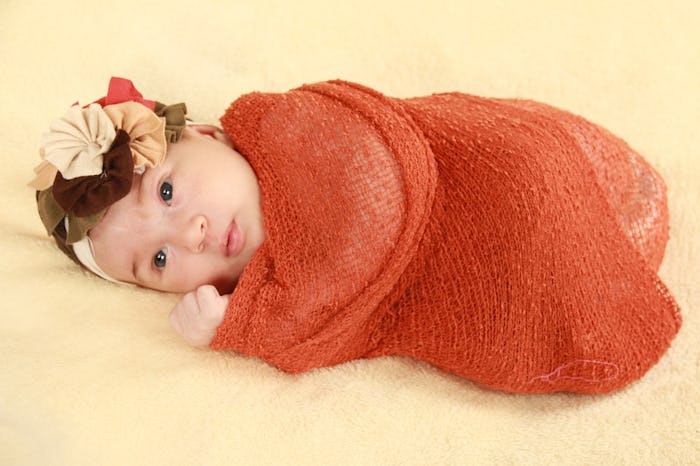My second son had hiccups in utero so often, it was no surprise when the pattern continued after he was born. Feeling the little pulses of his hiccups in my belly was an almost daily occurrence in the last few months before his birth. Which is why when I heard my little newborn make that hiccup sound for the first time, I laughed out loud. It just seemed natural that his little pattern would continue. I didn't know what causes hiccups in newborns, but I was interested to learn why this little guy couldn't seem to shake the darn thing.
First it helps to know exactly what a hiccup is. As Mayo Clinic explained, hiccups happen when the muscles of the diaphragm contract, which causes a sudden closure of the vocal chords (which is responsible for the "hic" sound). One reason babies are so prone to this hiccups is the size of those tiny tummies. According to the website for What To Expect, "a full stomach, taking in too much air while feeding, or a sudden change in temperature," are all reasons your baby could be experiencing a case of the hiccups. Which explains why my little fella seemed to have them most often after eating.
If your small fry is getting the hiccups on the reg, don't stress. As Baby Center pointed out, unless it's interfering with sleeping or eating, there is no reason to seek help for a baby's hiccups. Usually, the baby is just fine and the moment will pass. In fact, as the website for Healthy Children pointed out, a baby having the hiccups is more likely to bother parents than the baby.
Are you one of those parents who just can't bare for your baby to hiccup too long? Then you may want to try to help your munchkin stop hiccuping by patting and gentling rubbing her back, as The Bump suggested. You can do this by placing the baby in a seated position on your lap, lying her across your thighs, or supporting her upright on your shoulder.
Most babies are happy despite their hiccups, so don't worry if your baby lays down a "hic" beat every day. And remember it won't last forever, since this occurrence usually goes away around the time your baby turns one, as Baby Center pointed out.
